
Country Joe and the Fish was an American psychedelic rock band formed in Berkeley, California, in 1965. The band was among the influential groups in the San Francisco music scene during the mid- to late 1960s. Much of the band's music was written by founding members Country Joe McDonald and Barry "The Fish" Melton, with lyrics pointedly addressing issues of importance to the counterculture, such as anti-war protests, free love, and recreational drug use. Through a combination of psychedelia and electronic music, the band's sound was marked by innovative guitar melodies and distorted organ-driven instrumentals which were significant to the development of acid rock.

The Music Machine was an American rock band formed in Los Angeles, California in 1966. Fronted by chief songwriter and lead vocalist Sean Bonniwell, the band cultivated a characteristically dark and rebellious image reflected in an untamed musical approach. Sometimes it made use of distorted guitar lines and hallucinogenic organ parts, punctuated by Bonniwell's distinctively throaty vocals. Although they managed to attain national chart success only briefly with two singles, the Music Machine is today considered by many critics to be one of the groundbreaking acts of the 1960s. Their style is now recognized as a pioneering force in proto-punk; yet within a relatively short period of time, they began to employ more complex lyrical and instrumental arrangements that went beyond the typical garage band format.

Thomas Harvey "Sean" Bonniwell was an American singer-songwriter/guitarist, who was known as the creative force behind the 1960s garage rock band, The Music Machine.
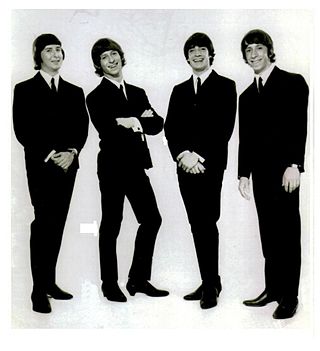
Los Shakers were a popular rock band in the 1960s and was a part of the Uruguayan Invasion in Latin America. They were heavily influenced by the look and sound of The Beatles. In the late 1960s they would broaden and expand their musical direction before breaking up in 1969.
The Uruguayan Invasion was a musical phenomenon of the 1960s similar to the British Invasion, with rock bands from Uruguay gaining popularity in Argentina.
Ultimate Spinach was a short-lived American psychedelic rock band from Boston, Massachusetts which was formed in 1967. In terms of style and national recognition, the band was one of the most prominent musical acts to emerge from the "Bosstown Sound", which was a marketing campaign posing as a regional attempt to compete with the San Francisco Sound. During the group's existence, they released three albums, with their self-titled debut the most commercially successful.

The Nightcrawlers were an American garage rock band formed in Daytona Beach, Florida in 1965.
Not to be confused with Styx (band)

The Quests was a Singaporean pop band. Founded in 1961 by guitarist Chong Chow Pin, lead guitarist Raymond Leong, bassist Henry Chua, and drummer Lim Wee Guan, they are considered the most successful Singapore band of the 1960s.
Twentieth Century Zoo was an American psychedelic rock band formed from the remnants of The Bittersweets in Phoenix, Arizona in 1967. The band released several singles, and an album to reach regional acclaim before disbanding in 1970. Their later works spanned across multiple genres, including early examples of proto-punk. The band was known for playing among other highly successful acts, and incorporating their influences into the group's own individual sound.
Wimple Winch was an English psychedelic pop band that evolved from the group, Just Four Men. Originally a Merseybeat act, their individualized sound was personalized by their intricate vocal harmonies and exploratory lyrics.

The Bonniwell Music Machine is the second and final album by the American garage rock band, The Music Machine, recorded under the renamed moniker, The Bonniwell Music Machine, and released on Warner Bros. Records, on February 10, 1968. As with their debut LP, the album again saw the band blending garage and psychedelic rock influences, albeit with a greater emphasis on psychedelia than on their previous album release. Prior to completing its recording, all of the group's original members, except for its creative force, Sean Bonniwell, departed, though they would still appear on some of the album's tracks.
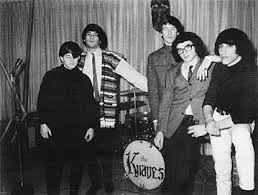
The Knaves were an American garage rock band formed in Chicago, Illinois, in 1964. The band released two singles during their existence, including the song "Leave Me Alone", which is now considered a classic of the musical genre of garage rock. In addition, the group's sound was particularly unique for combining elements of folk rock and proto-punk, making the Knaves stand out among their contemporaries.
The Magicians were an American garage rock band formed in New York City, New York, in 1965. The group released four singles during their brief recording career with Columbia Records, with their most well-known song being "An Invitation to Cry". Members Alan Gordon and Garry Bonner later became a successful songwriting duo, and the Magicians' material was assembled on a compilation album in 1999.
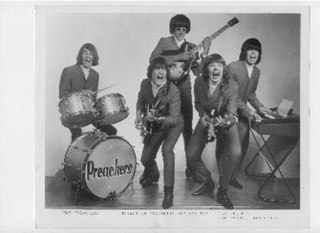
The Preachers were an American garage rock band formed in Los Angeles, California, in 1964. Musically, the group took an intense, and pounding musical approach that was heavily influenced by the British Invasion groups, particularly the Rolling Stones and the Dave Clark Five, and their take on American R&B. In their brief recording career, the Preachers released three singles, with their most acclaimed recording being a high-energy rendition of Bo Diddley's, "Who Do You Love?".

The Guilloteens were an American garage rock band formed in Memphis, Tennessee in 1964. Much of the band's musical stance was distinguished for incorporating their homegrown Memphis influences with a hard-edged sound. Among the group's singles, the Guilloteens are most-known for their regional hit "I Don't Believe" and "Hey You". Although national success eluded the group, they are now considered one of the more accomplished garage rock acts to emerge from the era.

The Freeborne was an American psychedelic rock band formed in Boston, Massachusetts in 1966. The band was one of the numerous groups associated with the "Bosstown Sound", and is noted for releasing one eclectic album, Peak Impressions, in 1967, which exemplified the young members' versatility embedded in psychedelia.
"My World Fell Down" is a song written by John Carter and Geoff Stephens, and first recorded by the English pop rock band the Ivy League, on Pye Records, in 1966. The song was covered a year later by the American sunshine pop group Sagittarius, whose version charted on the Billboard Hot 100. Sagittarius's version of the composition has remained highly sought after among record collectors for its close resemblance to the Pet Sounds-era Beach Boys.
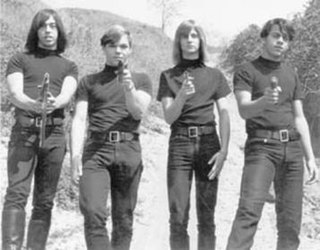
Public Nuisance was an American rock band from Sacramento, California who were active from 1964-1970, first as Moss & the Rocks, then later as Public Nuisance. In 1965 they recorded the song "There She Goes" as Moss & the Rocks for a single released on the local Icon label. After changing their name to Public Nuisance in 1967, they began to incorporate psychedelic elements into their sound and a series of mostly unreleased songs recorded at various sessions from 1968-1969 that went for years unissued, but finally saw the light of day in 2002 with the release of the Gotta Survive anthology. Since then, their work, both as Moss & the Rocks and Public Nuisance, has attracted the attention of garage rock and psychedelic enthusiasts worldwide.
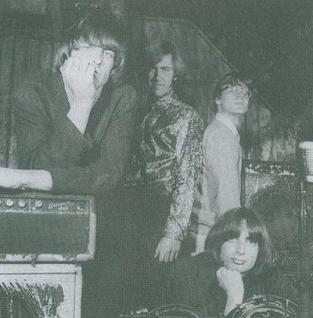
The Final Solution was an American garage rock band formed in San Francisco, California, in 1965. An early group in the development of what later became known as the San Francisco Sound, the Final Solution contradicted its contemporaries with their controversial name and grim lyrics composed by lead guitarist Ernie Fosselius and bassist Bob Knickerbocker. Although the group never released any recordings in their career, the band was pivotal in the San Francisco's live music scene. A recording of the Final Solution performing at the Matrix in 1966 exists and is available, particularly "So Long Goodbye", which appears on Pebbles, Volume 22.













